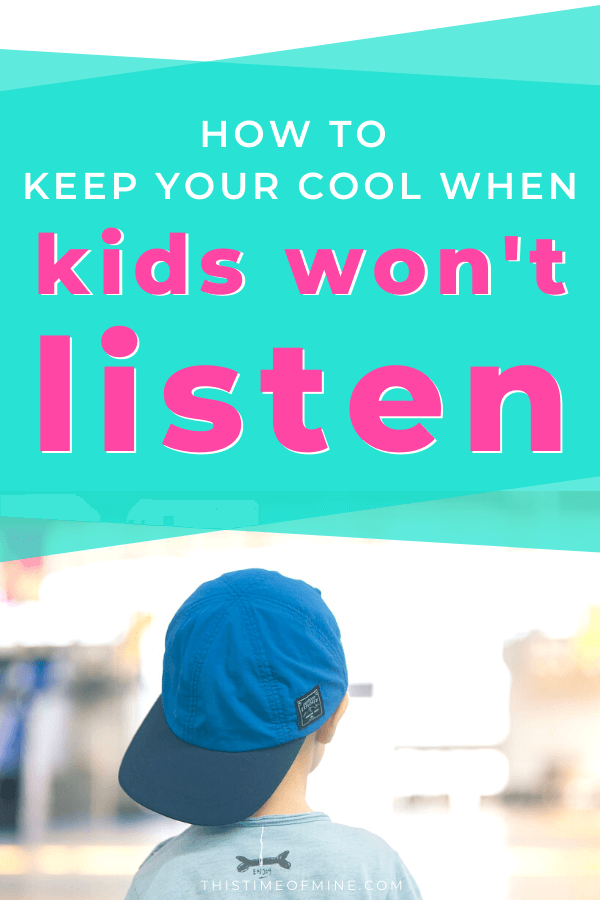How To Keep Your Cool When Kids Won’t Listen
Kids won’t listen? We’ve all been there. Try one of these ridiculously easy strategies next time so you can turn things around without losing it!

“Are you even listening to me?”
“You only listen when I yell!”
Have you ever found yourself saying things like this? I know I certainly have!
It’s so frustrating when our kids won’t listen or obey, especially when they act like we don’t exist until we go absolutely crazy.
This is what I discovered a few years ago when I found myself being THAT mom. You know, the hot mess that yelled at her kids all the time.
I knew parenting was hard, but also knew there had to be a way to enjoy it without getting mad at my kids all the time. So I set out to find actionable things I could try and implement. Things that would help me stay calm, get my kids to listen and break the cycle of anger and yelling I found myself in.
This post is a collection of 10 specific techniques that I learned from trial and error, talking to more experienced moms at the time, and some of my own parenting research. They’re easy to use, and more importantly – they work.
If you have kids that won’t listen and are sick of having to get mad all the time, then you’re in good company. So many of us struggle with that problem.
But having tools to use will help train our kids to listen, and give us the power to stay calm no matter the situation.

WHY WON’T MY KIDS LISTEN TO ME?
This post is going to outline 10 very specific strategies you can try when your kids aren’t listening. But before we get into that, it’s important to understand something:
When our kids ignore us, it’s not personal.
This is often a struggle for us as parents. I mean, if our kids loved us, like really loved us, wouldn’t they just listen and obey every time we spoke?
Nope. Sorry. Kids don’t work that way. They’re still learning and developing, and will be for a long, long time.
So now that’s out of the way, here are 4 common reasons kids won’t listen – that have nothing to do with their love for us:
1. They’re testing a boundary.
In order to learn their environment and understand their relationship with you, kids need to know where the boundaries and limits are. These are what help them feel safe and secure as they explore their world.
And so they push, test, and try until they learn exactly where those boundaries are. And then they often test a few more times, just to make sure.
2. They haven’t been taught.
Kids are always learning. And often, what’s common sense to us isn’t common sense to our kids yet.
It’s easy for us to forget that. We can expect certain reactions and behaviors to be natural, when in reality, they’re reactions and behaviors we still need to teach and reinforce.
3. They’ve been trained to wait until we yell.
When we want something done, we have to be ready to follow through. If we keep repeating ourselves, our kids learn that they don’t actually do anything until the 3rd or 4th time.
And when all we do is yell, our kids simply learn to tune us out. Instead, try using some of the very effective yelling alternatives in this post. They go hand-in-hand with the techniques outlined in this post.
4. They just don’t want to.
Just like us, kids have “off” days too. If they’re having a particularly hard time listening, there might be something else going on.
This would be a great day to find time to connect with them using one of these quick ideas. Then you’ll both be in a better place to work on the listening issue.
In the end, the fact that our kids won’t listen isn’t always a personal attack. But it’s still frustrating. Which is why it’s also important to understand your personal anger triggers so you can be better prepared to face the situation calmly and rationally. (Head here to learn more about the triggers that make us yell.)

10 Simple Strategies To Use When Kids Won’t Listen
I never wanted to be one of those yelling moms. But when I found myself yelling all the time, I realized that much of it was due to a lack of knowledge.
I realized I needed specific strategies and techniques to use. Tools in my parenting toolbelt.
And that’s exactly what each of these are. They’re all simple, but very effective ways of getting our kids to listen the first time so we can finally parent without getting mad.
1. Say it again, but differently.
This is different from repeating yourself. When we say the same things over and over, our kids will eventually learn to tune us out. (That includes yelling!)
So mix things up. If they won’t listen the first time, repeat your instruction, but in a completely different way. Try one of these tricks:
- Rephrase the instruction.
- Use a different tone of voice or voice inflection.
- Say it quieter.
- Say it slower.
- Get silly.
- Sing it or dramatize it.
- Say only one word. (i.e. “shoes”, “car”, etc.)
2. Use Physical Touch
Sometimes all it takes is a gentle hand on the shoulder, back or knee to get your child’s attention and let them know you’re serious.
Or maybe they just need a good tickle or a big hug.

3. Make Eye Contact
Kids can get so focused on what they’re doing, that they won’t register anything outside their field of vision.
So make sure they’re looking right at you before giving instructions. And to be even more effective, get right down to their eye level.
4. Have Them Repeat Instructions Back To You
To make sure they’ve heard you and that they understand the instruction, have them repeat what you’ve said or explain what they’re supposed to do.
For example, if you’ve told them to put their plate in the sink after their snack, you could ask them, “Ok, what are you supposed to do when you’re done eating your snack?” to which they could respond, “I’m supposed to put my plate in the sink.”
5. Write A Note
Tired of repeating yourself all the time? Maybe it’s time to use something totally different to get your kids’ attention. Try writing a big note!
If your kids are constantly leaving their things on the floor, forgetting to put things away after using them, or doing anything you’re sick of reminding them about…leave a note.
It’ll be enough to make them notice!
6. Don’t Lead With Don’t
When we hear a sentence with “don’t”, that’s usually the only word we don’t hear.
“Don’t think about elephants.”
Ok, now are you thinking about elephants? Me too.
Well, kids are the same way. Whenever we tell them what we don’t want them to do, they’re much more likely to do just that! Try telling them what you’d like them to do instead.
Here are a few examples:
- Rather than, “Don’t hit your sister,” try “This is how you can use your hands nicely”.
- Rather than, “Don’t spill your milk,” try “Hold your cup with two hands and go slowly.”
- Rather than, “Don’t jump off the couch,” try “Couches are for sitting. But we can jump over here.”

7. Offer Sensory Outlets
Did you know that when sensory needs aren’t met, it’s extremely difficult for kids to sit still and focus?
I have a son with high sensory needs and couldn’t figure out why it was so hard for him to listen – even when he’d been running around all day. Turns out, he needed very specific things to fulfill those sensory needs, and they weren’t what I’d expected.
This article helped me as I started my journey toward learning more about fulfilling those needs.
8. Physically Intervene
If your kids just won’t listen, it’s time to get physically involved. Take the toy away, shut the screen off, pick them up and move them, or just stand in the way.
This strategy is especially important when it involves safety.
9. Master The Art Of Distraction
An alternative to getting physically involved is to simply distract them.
Offer an alternate activity or toy to get their minds off of what they’re doing. Make the new option sound enticing and cool.
10. Teach Proper Responses
Sometimes, kids seem like they’re ignoring you. But in their minds, they don’t think they’ve done anything wrong. They heard you but didn’t know they were supposed to respond.
Help them know what constitutes a proper response. That can be anything from “I’m coming,” to “Hold on, I’m almost done,” or even just “Yes, mom.”
REMEMBER TO ACKNOWLEDGE IMPROVEMENT
If listening has been a recent struggle in your house, be sure to notice when your kids are making the effort to improve. Simple phrases like “Thank you for listening the first time,” can go a long way.
Positive reinforcement will help the habit stick.
GET KIDS TO LISTEN THE FIRST TIME, EVERY TIME
When kids won’t listen, our first and natural reaction is to get mad. Unless we’re equipped with actionable strategies to try, that is!
So stock your parenting toolbelt with these tips. They’ll come in handy.
OTHER HELPFUL POSTS:
- Do This, Not That! 10 Powerful Alternatives To Yelling
- The Surprising Reasons You Yell At Your Kids And How To Stop
- 5 Simple Ways To Discipline Without Yelling
want to remember this?
PIN IT TO YOUR FAVORITE BOARD
Share this article:


